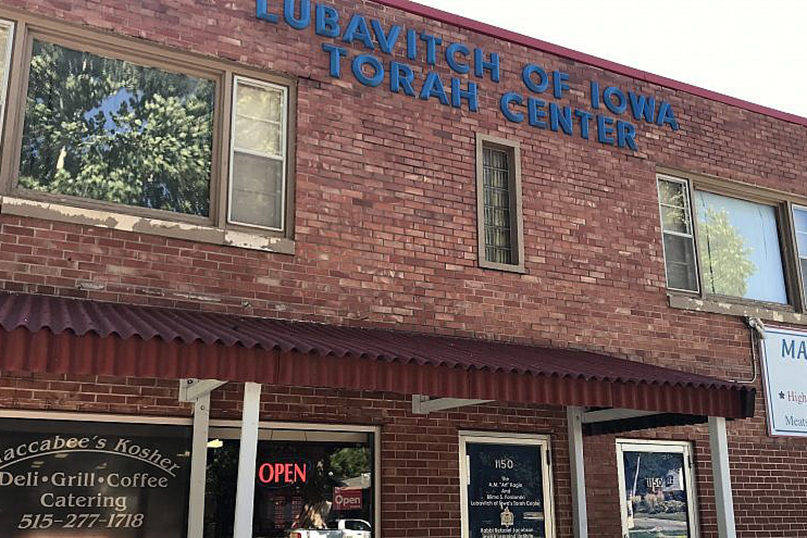
Small in size, Iowan Jews play an outsize role in their state’s prized presidential caucus
By Jackson Richman
(JNS) DES MOINES, Iowa – With 165 days until the Iowa Caucus, the scene in the central Midwest has been busy in and outside the state’s annual fair with the candidates making their case over the past couple weeks at the fair’s “soapbox,” hosted by The Des Moines Register and elsewhere.
The Jewish community in Iowa – approximately 5,450, or less than one percent of the state’s population, with most of them in Des Moines – has been anything but absent from the action (there are even campaign kipahs at the state fair).
“Although small, we are a disproportionate share of the voter turnout; most of us participate in the political process, voting or volunteering for candidates or supporting them in other capacities. The community is strong,” said David Adelman, a Democratic political consultant for state and federal clients, a former president of the Jewish Federation of Greater Des Moines and currently the president of the Federation’s foundation.
With most of Iowa’s Jewish community identifying as Democrats, Harlan “Bud” Hockenberg, a veteran Republican operative and leader in the Iowan Jewish community, says he’s lived his whole life as “a minority within a minority.”
Regarding the Jewish community’s involvement in the Iowa Caucus, Adelman, who is also chairman of the Iowa division of the American Israel Public Affairs Committee and serves on AIPAC’s national council, says, “Iowans generally take their role as first in the nation’s caucuses very seriously. I don’t think that’s any different with the Jewish community in Iowa.”
Leading up to the Feb. 3 caucus, Iowa’s Jewish community will be “taking a keen interest in the process – meeting with these candidates, asking them questions and even hosting them for roundtables, living-room townhalls or perhaps even for dinner, some of whom may even be [at] High Holiday services,” says Adelman.
In past caucuses, the Iowa Jewish community has offered a venue to talk to the Jewish community. In 2015, former Secretary of state Hillary Clinton, Sen. Bernie Sanders (I-Vt.), former tech executive Carly Fiorina, former Sen. Rick Santorum (R-Pa.) and other candidates vying for their party’s nomination were at Jewish Federation forums.
Issues pertinent to the Democrats in Iowa’s Jewish community appear to be no different than other groups: health care, the economy, abortion and immigration. The topic of Israel seems to be secondary compared to the kitchen-table issues.
Adelman says it’s not just Israel, but foreign policy overall that hasn’t been front and center because “there’s such a weight upon the domestic agenda that people are focused on,” such as health care, “which affects their pocketbook the most.”
Nonetheless, he said, “as the process goes on, the Jewish community will identify candidates that speak to them on issues relating to the Middle East.”
On the Republican side, Will Rogers, a former secretary at the Jewish Federation and a former executive director of the Polk County Republican Party, says “Israel tends to be a very important issue – our strategic relationship with Israel and making sure that we have good, sound foreign policy regarding Israel and the Middle East. Defense is important there as well.”
Iowa’s Jewish Democrats overall support the Jewish state, though some are “a little more critical of Israel … maybe even critical of the current [Benjamin] Netanyahu administration, and that they’re looking to potentially find a different policy, a path to move forward,” he says.
Hockenberg, who has been involved in Iowa politics since 1980, said that the minor focus on Israel on the Jewish Democratic side in Iowa is “very clearly a reflection of the American political scene.”
“The Democratic Jewish community in America is opposed to Bibi Netanyahu as the prime minister because he’s more center-right rather than left. And that goes back to the Obama relationship with Bibi, which was more of a hands-off,” he says. “I think that has overlapped into the American Democratic Jewish community attitude towards Israel, and that reduces their support for Israel. They are concerned about certain issues in Israel, which are domestic, but they feel they’re entitled to have some comment and influence.”
Which candidates the Jewish community will support remains to be seen.
Adelman noted that “multiple candidates or their staffs have reached out wanting to speak about the U.S.-Israel relationship. Many of these candidates are careful not to be baited by the far-left anti-Israel activists, knowing that the majority of the Democratic voters are still overly supportive of a strong U.S.-Israel relationship.”
Antisemitism “does not occur that often” in the Des Moines area, according to Drake University political science professor Dennis Goldford, and Rogers agrees, though he knows people who have encountered such situations. As a result, says Rogers, Iowans seem not to see it as a topic of discussion.
‘We’re a purple congregation’
There are three congregations in Des Moines: Tifereth Israel (Conservative), Temple B’nai Jeshurun (Reform) and Lubavitch of Iowa (Orthodox rabbi). In 2016, the Orthodox synagogue, Beth El Jacob, closed and is now partnered with Chabad.
Temple B’nai Jeshurun, founded in 1873 as Des Moines’s first Jewish congregation, is Iowa’s largest and is led by Rabbi David Kaufman, who has been in Des Moines for 16 years, towing a moderate line politically in a time of immense polarization.
“We’re one of the most politically active congregations as far as membership goes,” said the rabbi of the 300-member-unit synagogue, some of whom belong to the other congregations in the area, including Chabad.
“Our members are involved in a lot of different things. That generally means that on a lot of things we have to maintain neutrality, especially when we’re dealing with internal party politics like primaries, so we tend to advocate for issues and take more moderate lines on issues,” he continued. “When we do, we try to seek something that’s going to be supported by both Republicans and Democrats that might actually get passed somewhere.”
However, Kaufman noted that most members swing to the left, though not as far left as Reform congregations on the East and West Coasts.
He cited the significant number of intermarried couples in his congregation being a factor for B’nai Jeshurun’s moderation politically and ideologically.
“If you have a congregation in which there’s very little interfaith marriage, you’re going to have a very progressive congregation,” he said. “But the second people start marrying in large numbers with people in the overall population, you’re going to bring in people who are less progressive because virtually everyone else is less progressive.”
Kaufman said that his members are involved in political causes such as abortion rights, gun control, protecting the environment, immigration rights and better health care.
“I do a lot of Israel advocacy; people leave that largely to me,” he said. “But we have a few others in the congregation who do that as well.”
Kaufman notes that leading up to the caucus, his congregation “tends to get very divided, and we have a lot of conversations going on, mostly online.”
“We’re a purple congregation,” says the rabbi, referring to the color in American political lingo that denotes a more moderate stance on issue or a shifting party affiliation.
“I’m a well-known moderate, so I get attacked oftentimes from both sides,” says Kaufman, a self-described independent whose sermons steer clear of politics. While Kaufman shies away from choosing a candidate, he was the only Reform rabbi to attend the first of two White House Chanukah parties in December 2017.
The rabbi, who teaches a huge monthly class on current events and foreign policy at Drake University in Des Moines, acknowledges that as a moderate “sometimes it’s more difficult to engage” in a political discussion.
“It’s been much easier to engage in that discussion in years past than it is now in our highly partisan political environment,” he says. “Anything that smacks of trying to promote understanding of Republican politicians results in attacks from the left oftentimes and the reverse is true….I try to present information and let people make their own decisions as much as possible, and I try to promote the basic Jewish ideals for things as far as what our texts actually say.”
A time to be Jewish
During caucus season, a lot of young people, including campaign workers, contribute to what Kaufman labeled “a charged energy.”
“You either have people who are really interested in coming to services because they believe that their Judaism connects to their politics and then they kind of bring their politics with them,” he says. “And then you have people who come to services because they want to get away from politics for an hour or a couple hours. There are people who want to take their buttons off and be a Jew at services.”
Kaufman said his congregants are involved in the caucus process – from listening to candidates at the soapbox at the Iowa State Fair and around the state. At the synagogue’s Friday night dinners, Kaufman goes from table to table and is wowed by “the depth of knowledge that a lot of people have.”
“They’ll quote policies to you from their campaign pages,” he said. “People take it seriously here.”
Nonetheless, the rabbi said that B’nai Jeshurun provides a Shabbat environment that allows people who want to get away from the political madness. If discussions happening at some tables at the dinners become intensely political, he notes, it’s not uncommon for some people to simply get up and move to another table.”
In addition, notes Kaufman, there is an open invitation for the candidates to speak at the synagogue, with some events being held at Tifereth Israel or the Jewish Federation.
Politics with a side of pastrami
Lubavitch of Iowa Rabbi Yossi Jacobson runs a Chabad center and Maccabee’s Kosher Deli, serving a slice (or more) of kosher heaven along with lifelong wisdom, especially leading up to the Iowa Caucus, which will be held Feb. 3, 2020.
Jacobson sat down with JNS at his deli which, he notes, began with frozen food at the Jacobsons’ home and grew into a proper store, thanks to the help of the community and former Gov. Terry Branstad, whose mother was Jewish. The rabbi, who has lived in Des Moines with his family for 28 years, said that “because there is so much noise today, people are beginning to hear the calling of Torah – the calling that God is calling everyone here for a mission to fulfill.”
“You’re standing in a deli and you’re talking to people. You’re learning from people and you’re giving people perspectives,” he said. “You’re giving a perspective of who we are as a people.”
Jacobson said that kitchen-table issues like health care dominate the political discussion in Iowa leading up to the caucus, but at the end of the day, “we just have to keep on succeeding in what God almighty lets us succeed with our families, our jobs, have more people come to the deli. I don’t have any hope other than Hashem. I have God-care. Please give me another day I don’t have to be in any level of sickness. So far, so good.”
Campaign volunteers not only go to the deli, but to the Jacobsons for Shabbat meals. Even a few Palestinian volunteers from Sen. Elizabeth Warren’s campaign had lunch at the deli three weeks ago.
“People love coming here. They feel a sense of clarity where there’s so much noise and clutter; they come to hear the calling,” said the rabbi. “They come to hear how Jewish people stand on all these issues.”
Jacobson said he hopes to welcome the 2020 presidential candidates to his deli.
Outside Des Moines
Outside Iowa’s state capital is a Chabad in Iowa City, Bettendorf, Ames and Postville.
Rabbi Aron Schimmel, who runs the Postville Chabad, said that the Jewish community there is about 50 families, most of whom are Orthodox. The Iowa Caucus is casually discussed, unlike in Des Moines.
However, Postville is no exception to the political sphere, as it was the place where Sholom Rubashkin infamously ran a now-bankrupt kosher slaughterhouse and meat-packing plant, Agriprocessors, employing – and some say abusing – undocumented immigrants. He was criminally charged with fraud and sentenced in June 2010 to 27 years in prison. The kosher plant was bought in a July 2009 auction and is now called Agri Star. In December 2017, U.S. President Donald Trump commuted Rubashkin’s sentence.”
Today, said Schimmel, there’s “a new era,” as the years have passed since that episode.
About three hours away from Postville, Rabbi Linda Bertenthal leads Temple Emanuel, a Reform synagogue in Davenport with around 105 families. Bertenthal, a registered Democrat, said like most Reform congregations, the synagogue’s members are mostly progressive, with a wide range of opinions on issues such as immigration and the environment.
In her sermons, she said, she doesn’t utter the word “president” or “Trump.”
“I consider every issue that I see an ethical dimension to, which is basically everything as fair game for sermonizing,” she said. “I talk about issues, never people or political roles or political parties, God forbid.”
Bertenthal noted that when attending candidate events “you always see a lot of fellow Jews there.”
Unlike Des Moines’ Jews, her community feels that antisemitism is on the rise. “It feels like a dangerous time to be Jewish, and everyone is incredibly security-conscious all the time wherever they go,” she said, noting that there are one or two off-duty officers protecting the synagogue during services.
Bertenthal said the neighborhood around Temple Emanuel’s sister synagogue, Congregation Beth Israel at the Tri City Jewish Center in Rock Island, Ill., has been “leafleted” with white-supremacist and antisemitic “literature.”
“We feel it over here,” she said, “plenty.”
However, Bertenthal added that there’s more love than hate in the community, including from non-Jews, who expressed support in the aftermath of the October 2018 shooting at the Tree of Life*Or L’Simcha Synagogue in Pittsburgh.
The rabbi has interacted with several presidential hopefuls, including Sens. Kamala Harris and Elizabeth Warren, and has accepted meetings with representatives of other candidates, including Sen. Kirsten Gillibrand and Pete Buttigieg, the mayor of South Bend, Ind.
What does Bertenthal tell the candidates? She and her husband seek to “convey how important it was to us for candidates for the presidency to really understand the issues in Israel and to understand them in a full historical perspective, and not to view it in some of the simplistic ways that many people view it. And how impossible it would be for us to support a candidate that didn’t support Israel’s right to exist.”
Main Photo: Maccabee Kosher Deli in Iowa.







 Southern New England Jewish Ledger
Southern New England Jewish Ledger















